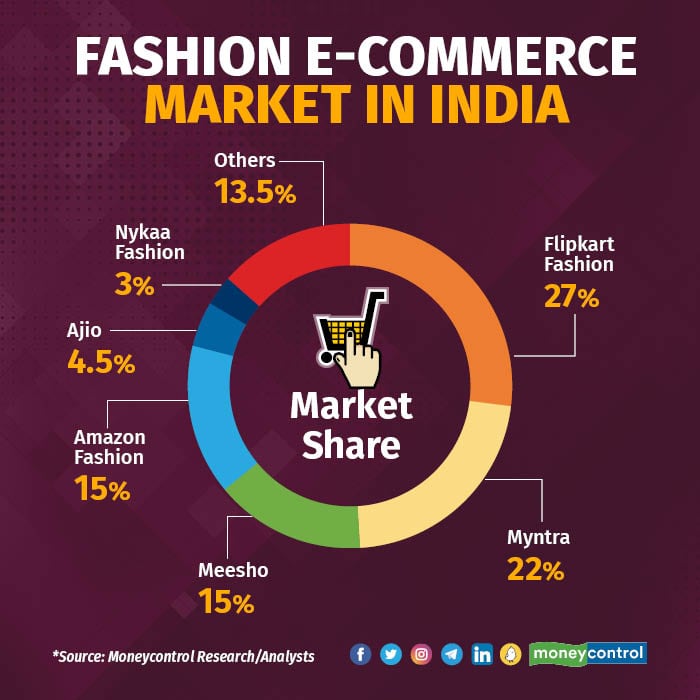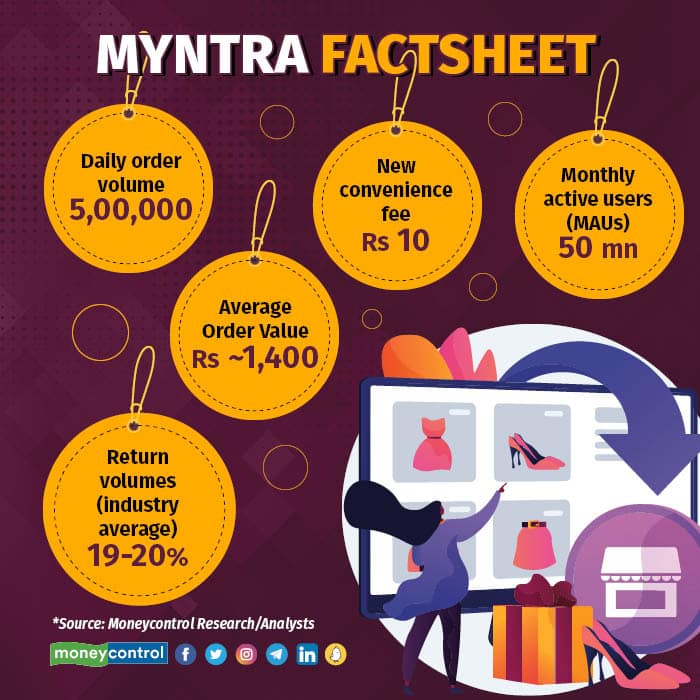



India’s second-largest fashion e-tailer has started levying a convenience fee of Rs 10 on every order placed on the platform above Rs 1,000, which will amount to a large corpus given its daily order volumes as the company looks to put itself on the path to profitability. For orders below Rs 1,000, the platform already levies a fee of Rs 99.
This fee is charged even to members of Myntra’s membership programme, Myntra Insider, making this a charge over and above all other levies. Analysts peg Myntra’s daily order volumes at five lakh a day.
'Nominal fee for world-class service'
In a pop-up message on the site, Myntra said that the fee is being levied for the services it has rendered — for providing technical expertise, brand aggregation, and post-sales support.
Confirming the development, a Myntra spokesperson said, "A nominal fee helps platforms like ours to provide a world-class shopping experience while offering the best value to customers and is well acknowledged in the industry."
The fee is significant as Myntra’s average order value (AOV) is estimated to be around Rs 1,400, according to analysts’ estimates.

The convenience fee is yet another step that companies like Myntra are taking to make their orders more profitable, and analysts say it is unlikely to deter customers from making purchases.
"The convenience fee of Rs 10 is not going to pinch customers because Myntra has a huge base of loyal customers and its market share is large enough, which allows the company to take these steps. It’s not a drastic step, and most buyers will ignore it," said Satish Meena, an independent e-commerce analyst who earlier worked with Forrester. Sources said that Myntra has 50 million monthly active users (MAU).
The new Rs 10 fee comes about two years after the company began charging customers Rs 99 as a convenience fee on orders below Rs 1,000. The fee of Rs 99 is still levied on regular users who place low-value orders, but Myntra Insiders only pay Rs 10 as a convenience fee irrespective of their order value, people aware of the matter told Moneycontrol.
The new levy is just one of a slew of measures that the fashion e-tailer has taken, the other being its efforts to curb returns.
The scourge of returns
Earlier this year, Myntra had started alerting customers if their return volumes were higher than usual, the company will start penalising them if they went beyond the threshold by either charging a significantly higher fee of Rs 149 or even going to the extent of suspending their accounts, as per reports.
Now, to discourage customers from returning products, the company is tying up with brands to give customers a coupon at checkout. The coupon gives the customer an upfront discount on the product but renders it ‘non-returnable’.
However, it can still be exchanged for any product on the site under Myntra’s open-ended exchange system. This way, the company avoids bank transfers or credit card reversal costs and helps weed out not-so-profitable shoppers, a person in the know said.
The discount is entirely at the brand’s discretion and may be introduced or rolled back at any time.
"...Myntra, in association with its brand partners, is also trying to solve how customers can choose to minimise their returns. Myntra’s pioneering data-science-led ‘Size and Fit’ recommendation engine and its widely popular industry-first ‘Open-Ended Exchange’ feature are some of the steps in that direction," the company spokesperson added.
Earlier, Myntra had a 30-day return window but has shortened this to 14 days for most categories, with fewer days for some rare exceptions. Other players in the e-commerce industry, like Ajio, Amazon Fashion, and Nykaa Fashion, have also reduced the timeline for returns.
"Myntra has a fairly liberal returns policy, and its generous return timeframe takes into consideration multiple factors, including the category of products and the time period required by customers to exercise this option conveniently," the company spokesperson said in response to Moneycontrol’s queries.
Taking the pressure off the bottomline
Return logistics has been an issue for most e-commerce companies, with fashion-centric ones particularly bearing the brunt because of the look and feel factor, a mismatch between pictures and the quality of the actual product, and sizing issues, among others. The company is trying to tackle this by leveraging artificial intelligence (AI), machine learning (ML), and other standardisation measures.
Analysts say return logistics account for about 16-18 percent of a product’s cost, making it an important line item that can influence a company’s bottomline.
As a percentage of total orders, the return rate for fashion products has increased slightly to around 19-20 percent from about 16-17 percent three years ago, the analysts quoted above said.
However, on a longer time horizon, over the past seven years or so, it has fallen from around 25-27 percent as the e-commerce category matured over the years.
"The return order volumes have also increased because of the demographics of new users. There’s an increasing number of people coming from Tier 2 and beyond cities who are new to e-commerce and fashion in particular, which has pushed up companies’ return order volumes," an e-commerce analyst said.

In fact, in a report, consulting firm Redseer said that a majority of shoppers during the previous festival sale came from Tier 2 and regions beyond.
Pakhi Saxena, Retail and Consumer Packaged Goods (CPG) Head at Wazir Advisors, said that given that e-commerce marketplaces have invested in building the online channel, they will look at optimisation and operational efficiency as the online channel matures.
"Charging a convenience fee due to high returns by a key marketplace is a step towards the above. If their system records the customer’s return rate and the rate is higher than average, the customer is charged a convenience fee for the next order. The balance of additional discounts and no return policy is what the players have to achieve for continued customer loyalty," she said.
The monetisation effort comes at a time when companies are fast-tracking their profitability timelines as capital becomes difficult to access. Results for FY22, which is the latest available, show Myntra's losses widening by 39 percent to Rs 597 crore, up from Rs 429 crore in FY21, hurt by an increase in logistics costs and other promotion and ad-related spends. However, during the same period, the company’s operating revenue jumped 46 percent to Rs 3,501 crore in FY22 from Rs 2,407 crore in FY21, helped by an increase in marketplace services and advertising income.
Will others follow suit?
Analysts that Moneycontrol spoke with said Myntra’s steps are in the right direction as the larger industry irons out certain policies to make the trade more profitable, and several players will follow suit after what Myntra has implemented.
"All of Myntra’s recent moves will mean that customers shop with more awareness and will be discouraged from unnecessarily returning items because of minor issues that can otherwise be easily overlooked. Even if Myntra is able to reduce its return order percentage by 4-6 percent, they would have achieved their goal," said Meena, who expects other companies to take similar measures.
However, Vidit Aatrey, Co-founder and Chief Executive Officer (CEO) of low-priced fashion marketplace Meesho, was in disagreement and said initiatives like levying an additional convenience fee would discourage shoppers.
"Making returns smooth is a very fundamental part of a good consumer experience. If a customer does not like a product and if it is hard for them to return the product or get their money back, it will bring fewer people back to the platform," Aatrey from Meesho told Moneycontrol.
It was especially important for Meesho since its AOVs of Rs 400-450 were much lower than Myntra’s Rs 1,400, which meant Meesho’s customers were more price sensitive.
"If there's any amount of friction, say with an additional cost where I begin to charge or do something else that makes the shopping experience costlier, we see it impacts the consumer experience a lot," he said.
"I don't think we're going to fundamentally charge customers a convenience fee for returns or do something else to bring our return percentage down. I don't think that's the right thing to do as a business," Meesho’s Aatrey concluded.
Discover the latest Business News, Sensex, and Nifty updates. Obtain Personal Finance insights, tax queries, and expert opinions on Moneycontrol or download the Moneycontrol App to stay updated!